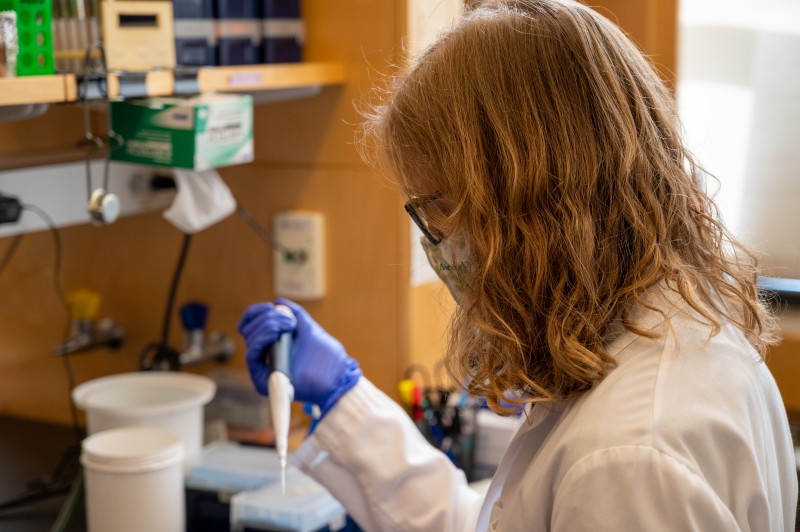
A Conversation with Chiara Masnovo, my Undergraduate Research Mentor!
When considering Tufts, the questions “what will research be like, and with whom will I be working?” were at the forefront of my mind; as such, here are a couple of questions I asked my mentor - I believe you may find them enlightening as to the type of personality Tufts attracts and what the research experience is like as an undergraduate.
Who we will be getting to know today is Chiara Masnovo, a Ph.D. student in the Mirkin Lab who has decided to study in the United States after receiving her bachelor’s and master’s in Europe. Chiara has fully taken me under her wing, teaching me various methods which are commonplace in genetics research. Currently, we are working together on her project investigating the uncoupling between DNA polymerase and the replicative helicase at structure-forming DNA repeats.
Vaughn: “One of the virtues of Tufts is that we have a community of learners who hail from diverse backgrounds. Can you tell me a bit about where you completed your undergraduate and masters of science degrees? What attracted you to Tufts specifically after earning these degrees?”
Chiara: “I went to the University of Vienna for my undergrad. There wasn’t a major or minor. So, I picked Biology and decided to specialize in Microbiology because I was really attracted to small things I couldn’t see and how they worked. That was a nice first encounter with the world of science - I went to a scientific high school but didn’t have much of a lab experience. As soon as I went into a lab and did experiments myself, I knew that is what I wanted to do. During my undergrad, I realized I really liked cells as a whole - how proteins and organelles work in a cell. So, I decided to do a masters in cell biology - I had already decided to pursue a PhD, and in Europe you have to earn a masters before a PhD. It was really useful, as I learned to think independently - a skill I didn’t have when I finished my undergrad. I came to Tufts for two reasons - first, I was interested in DNA repair. We have three great labs here that work on this topic, so I had a lot of opportunities. Also, there is a nice focus on teaching for graduate students. There are pedagogy courses and training opportunities such as the GIFT program that I can do in the future!
V: “When rotating through different labs at Tufts, did you learn any particularly valuable skills which you now apply to your own projects? Do you have a favorite moment you could share?”
C: “I rotated in two DNA repair labs. Both work with yeast and repetitive elements - although different ones. They have somewhat different approaches. In the first rotation, I learned how to do a lot of fluorescence microscopy to learn where these repeats are located in the cell. In the Mirkin lab, what I did was mostly focus on repeat instability. One thing I learned in both labs that is really important is how to plan a project and how to think critically about literature and my own ideas. My favorite moments are when I see a result, I sit down, I think about it, and I see how it fits in the model of a process. This works with small things and big things. Solving problems is my favorite moment!
V: “Could you tell me a little about your core research interests now? How is Tufts supporting you in achieving your goals? What drove you to choose the Mirkin Lab?”
C: “My core interests now are in the field of DNA repair - specifically DNA repair when combined with repetitive sequences. Repetitive sequences in the genome, especially in the human genome, are known to form secondary, alternative structures that do not look like the normal DNA double helix. Right now, and in the future, I would like to look at how the DNA machinery that replicates DNA - the replisome - interacts with these DNA. This is really interesting on a broader, biomedical level, because these repeats are involved in the genesis of 40 diseases; maybe even more. Tufts is a really great place for this - first, I get to take a lot of classes that help me understand what to do and the background on what’s known in science. In the Mirkin Lab - well, Dr. Mirkin is really an expert in both of these things - DNA repair, alternative DNA structures, and repetitive sequences. Also, he is a great mentor, he’s very supportive, and the lab itself is a great environment to be in to develop these things.
V: “After your Ph.D., what career field are you hoping to join?”
C: “What I would like to do is stay in academia. Do a postdoc, and eventually try to have my own lab either here or in Europe. I’d like to have the opportunity to do a lot of science, teach lectures, and have people in my lab that I can train - both undergraduates and graduate students.”
After having worked with Chiara for several weeks, I can see her profound passion and dedication towards her work. She not only explains procedures thoroughly to me but concerns herself with my learning of the concepts behind the techniques - a trait seen in most great professors. When having a conversation with Professor Mirkin, he mentioned his admiration for her rare brilliance; truly, it will be interesting to see where she ends up in several years!


